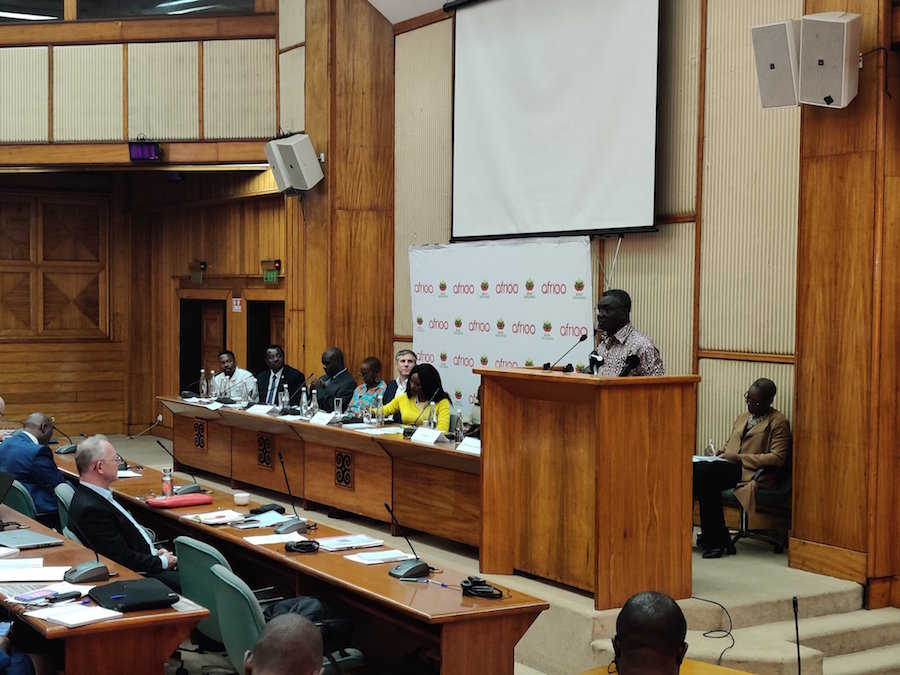
By Kofi Adu Domfeh
Ghana’s Minister of Environment, Science, Technology and Innovation (MESTI) has made a strong case for the protection and restoration of African forests, saying the forests remain the potent source for sustainable livelihood.
Opening the 4th AFR100 Annual Partnership Meeting in Accra, Prof. Kwabena Frimpong Boateng alluded to the forest as housing plants for medicines, food and providing oxygen to sustain lives.
“Therefore, anytime we are destroying our forests, let’s remember we are destroying our pharmacy, our supermarket, and our lungs,” he said.
The African Forest landscape Restoration Initiative (AFR100) is a Pan-African effort to bring 100 million hectares of land into restoration by 2030, with the goal of enhancing food security, increasing climate change resilience and mitigation, and combating rural poverty.
Ghana, for instance, made a commitment in 2015 to restore 2 million hectares of degraded lands.
Prof. Frimpong Boateng said to achieve such pledges, there is the need to harness technology in landscapes restoration “because the poverty gap is a technology gap”.
Engaging Young People in Restoration
The meeting brought together leadership from 28 partner countries, restoration champions, private sector representatives, and technical experts to drive the agenda of restoration.
The AFR100 Secretariat at the African Union Development Agency (AUDA-NEPAD) selected five Youth Ambassadors to represent the Initiative at the meeting.
“AFR100 will never reach its goals without putting young Africans and entrepreneurs at the core of its work and programmes,” said Mamadou Diakhite, representing the CEO of AUDA-NEPAD, Dr. Ibrahim Mayaki.
Youth Ambassador Siyabulela Siya Sokomani is passionate about creating entrepreneurial opportunities for young African people within the value-chain of restoration.
He believes the commitments of countries under the AFR100 offer opportunities to boost entrepreneurial activities among the youth through ecological restoration business.
“Tree planting can be mobilized into landscape and should be fashionable, accessible, profitable and affordable for the youth”, he noted.
Acknowledging the role of young people in landscape restoration, Minister Frimpong Boateng said it will be a mistake if the youth are not engaged in restoration.
“The young people of the world, including in Africa, have dreams they can no longer afford to postpone, and it is our duty to make sure that dream are fulfilled; we cannot fail them,” he emphasized.
Ghana’s Forest Plantation Strategy has Young People in Focus
Ghana has lost over 80 percent of its 1.8million hectares of real forests to illegal mining and logging as well as unsustainable agricultural activities.
In the past one year, over 26 million seedlings have been planted on about 24,000 hectares of land under the government’s “Youth in Agriculture and Afforestation Programme”.
Richard Ebo Quansah has worked with 250 young people to plant 15,000 trees and 3,000 bamboos on a 50 hectare land along the Densu water basin in the Joma community of the Greater Accra region.
Despite challenges with the early release of allowances, the youth have remained committed to the programme implementation.
“The trees have other benefits that is going to help us and the future generation. The money is needed now but the trees are needed for the future,” said Richard. “However, we need the requisite motivation to keep up the momentum of sustaining the plantation programme’
The Programme seeks to establish 25,000 hectares of forest plantations annually and to restore degraded forest reserves to help protect the green cover of the country.
Optimism for AFR100
Wanjira Mathai, Senior Advisor at the World Resources Institute (WRI), wants more young people to have the space and support to be involved in innovative environmental entrepreneurship.
“The generation that is actually going to deliver a lot of these ambitions that are being made today are the youth so they must be involved,” she said. “If we leave them we leave them at our own peril”.
Wanjira is proud of the commitments by partner countries but looks forward to restoration action in the next level.
“I’m optimistic. We didn’t think we would have 113million hectares of commitment when we asked for 100million, so we can move into implementation because after all our survival depends on it. We have got to make sure that we are cushioned from the impacts of climate change that are coming; this is real and for us on the continent, it is a matter of life and death,” she noted.











